- Home
- Various Articles (IP&SEN SIG) Inclusive Practices and Special Educational Needs SIG (IP&SEN SIG)
- Chain Experiment in Pre-school
Chain Experiment in Pre-school
Dorota Kaniak-Szymkiewicz has been a teacher of English for many years. She taught different levels and ages including preparing students for Cambridge ESOL exams. Over 30 years ago, together with her very experienced friends, she founded a language school that conducted English courses for all age groups and different levels. International College is their company that runs a kindergarten called “EU Kids" where English is the language of instruction. Dorota has experience as a coordinator and partner of many international projects financed by the European Union. Email: d.szymkiewicz@icollege.com.pl
Acknowledgement
In 2018 EU Kids Kindergarten in Sopot, Poland joined an international educational project Erasmus+ entitled “Chain Experiment in Pre-School”. The aim of the project was to stimulate children’s creativity, interest in experiments and technology as well as connecting generations. The project coordinator was Ljudska Univerza Jesenice in Slovenia. More at https://eukids.pl/projekt/
You can find a power point with more glimpses from the project at the bottom of this page.
The need for the program
The Europe 2020 strategy, which focuses on smart, sustainable and inclusive growth, requires skills development and hence the achievement of economic growth goals. The first challenge this program addresses is poorly developed technical skills - for around one-fifth of EU masters students. Basic skills are essential for learning, acquiring basic competences and personal development. The World Economic Forum has formulated a list of 21st century skills.
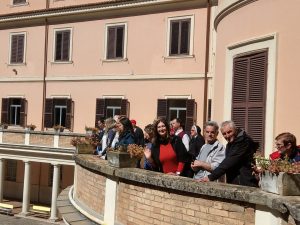
The current mismatch of skills and competences threatens Europe's innovation and results in a lack of adaptability as well as a lack of flexibility and citizens' mobility. The supply of highly qualified and well-educated employees is growing, and the demand for engineers is growing. Future demographic trends, which are now also affected by the pandemic, technological developments, digitization, increasing environmental pressures and other goal-related trends, require continual acquisition of skills and competences every day, as well as continual adaptation of skills to market needs. It is important that lifelong learning covers the largest possible population where quality and accessibility are essential, especially for the most disadvantaged groups. An efficient, high-quality education system, the purpose of which is to prepare an individual for effective work, participation in social life, and thus achieving a good quality of life - is also a basic condition for a competitive economy and social welfare. Education should offer more skills-based vocational training and promote continuing professional development (CPD). Students at all levels are becoming more and more mobile and remain mobile even after graduation. Erasmus+ teaches, offers, and promotes this mobility.
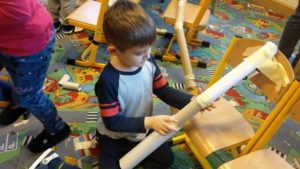
The exchange and transfer of knowledge takes place through the involvement of key elements: science, the education system and the economy. The high level of education among young people is growing rapidly, which is in fact desirable in view of the economy's need for a highly educated and properly trained workforce. There are many discrepancies between supply and demand for the available manpower. This is because of the mismatch between the knowledge and skills of the workforce and the needs of employers. This hinders production growth and raises questions about the use of skills. There is also a significant risk of migration of intellectual potential. Bridging the gap between knowledge and skills is also one of the factors in reducing social exclusion. Employment dynamics and structure, volatility, mobility, adaptability and structural disruption are factors that must be taken into account during and after the pandemic.
Developing basic technical, math and science skills among preschool children is the cornerstone on which children build knowledge based on understanding and previous experience. Through a well-conducted exploration of their thoughts, the child is able to compare them with new, different experiences, and is able to reflect on natural phenomena, objects and substances. Pre-school exploration is also based on taming the child's intuitive concepts, naive ideas and interpretations, and is an integral part of the natural environment. If we want to develop the basic technical skills of preschool children and encourage them to innovate, we need to give them the opportunity to experiment for themselves. Experimentation allows children to expand their knowledge and gain new skills. In this way, children are more interested in natural sciences and not only in further education but also in later life they are interested in a career in science, engineering and technology.
Another challenge is the rapid aging of the population. The generation gap is also a deep cultural gap between different generations. Intergenerational learning is one of the most important ways to fill this gap and leads to solidarity and trust.
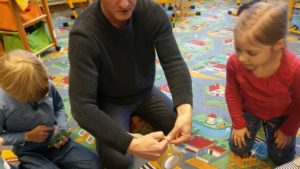
Intergenerational cooperation is extremely important due to the increasing and very clear differences between the younger and older generations. These are the differences in knowledge and values, which cause a generation gap that prevents the free sharing of knowledge enriching all generations.
In addition to solidarity and harmony, intergenerational cooperation means active and equal work to achieve goals. Generations collaborating through various tasks and projects create strong and valuable social bonds and networks that all participants benefit from. That is why it is so important that we create environments in which all generations are equal partners and draw from each other's knowledge and experience. This exchange leads to respect and admiration for the elderly.
The project coordinators from Slovenia, seeing the problem in their country as well as in other European Union countries, suggested to the project partners from Italy, Croatia and Poland to deal with this issue at the pre-school level.
The EU's demographic changes in the decades to come will be extremely important as current trends show that the EU population will age even more due to the low birth rate and the increasing duration and unpredictable changes during and after the pandemic.
Project participants
Preschoolers
Pre-school children learn and develop basic technical and scientific skills and thus develop an interest in technical professions later in life. Children up to the age of 6 are in the developmental phase where they begin to develop the ability to plan ahead and are able to predict progress in specific activities.
At this stage, the child's cognitive development, especially memory development, is accelerated. For this reason, the acquisition of basic technical, mathematical and scientific skills plays a very important role.
Pre-school children learn important and positive intergenerational communication skills. Intergenerational cooperation between the older generation as mentors and pre-school children is an important learning factor in which pre-school children gain experience and learn from adults and have positive mutual feelings.
Children, through their play, directness and openness, also help to improve the quality of life of adults participating in the project.

Senior mentors
Seniors (grandparents, volunteers) participating in the project gain or expand their knowledge of preschool education and pedagogy, which enables them to cooperate and care for preschool children. They have the opportunity to use new knowledge and practical skills, and at the same time can exchange good practices and innovations in the next stages of the Chain Experiment. The exchange and transfer of experience and knowledge, mutual assistance, socializing, learning and expanding the social network also help to increase the social inclusion of older people and increase their motivation, commitment and willingness to participate in the project. Older mentors, after adequate training to ensure that they continue to be active, often spontaneously decide to volunteer and engage in activities that develop and modernize their interests and hobbies.
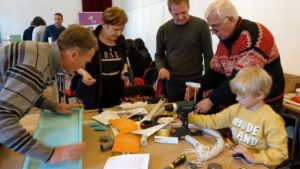
Adult educators
Adult educators have the opportunity to acquire or expand the knowledge and practical skills needed to build a chain of Chain Experiments. Their competences to work with preschool children, seniors and also invited parents are deepened. This work strengthens intergenerational cooperation. By engaging in the activities of Chain Experiments, adult educators broaden and deepen their experience in working with kindergartens, but also with non-governmental organizations, to which volunteers belong. Life experience and knowledge are one of the foundations with which we enrich the function of adult education organization and reach various target groups. Adult teachers can disseminate examples of good practice to other adult educators. This increases the number and quality of intergenerational activities in adult education organizations and the number of mentors.
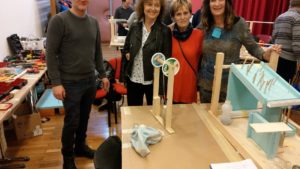
Objectives of the program
The objectives of the program are the following:
• developing mathematical, scientific and manual skills of pre-school children, familiarizing them with physical phenomena and inspiring them to technical professions through the acquired knowledge,
• encouraging senior mentors, educators and adult educators to increase the interest in technical professions among preschool children,
• developing communication skills and a positive attitude towards older people and encouraging learning from each other, thus strengthening intergenerational cooperation,
• encouraging the development of volunteering among the elderly and preventing social exclusion,
• increasing awareness of the importance of sustainable development by encouraging the re-use of various materials,
• developing the Chain Experiment in kindergarten, as an example of good practice of intergenerational activities that connect the area of adult and preschool education,
Scope of activities
The program covers 60 hours.
It is recommended that class hours be scheduled during one school year. Workshops should be held once a week, maximum 1.5 hours.
Special part
Chain Experiment providers and their specific knowledge
- Senior mentors of Chain Experiment who have knowledge of physics, mathematics, engineering and broadly understood sciences, and have experience in pedagogy. Other seniors who have well-developed manual skills and are passionate about working with children,
- Kindergarten teachers who have planning knowledge, organizing, conducting educational work, working with parents, grandparents, having knowledge in the field of preschool education and child development as well as in the field of motivation of pre-school children,
- Adult educators who have experience in the field of intergenerational cooperation, who can monitor and recognize educational needs and who can adapt the educational offer.
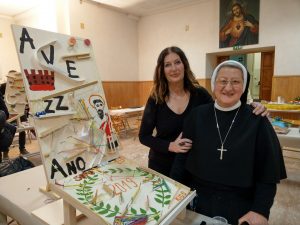
Content
What is a Chain Experiment?
A Chain Experiment is a set of devices that are driven one after the other so that the previous device triggers the action of the next, according to the domino principle. The link between the devices of the experiment and the factor that sets the successive elements of the chain in motion is a metal, glass or wooden ball with a diameter of 2 cm, which moves between adjacent elements, and then, after the operation of one of the devices ends, it rolls to the adjacent device and starts its "experiment". The name is CHAIN EXPERIMENT because the devices are chained together.
A Chain Experiment can be carried out in various places: in the classroom, in playgrounds, at school camps and at public events. With a little imagination, we can use any terrain to conduct a Chain Experiment in nature.
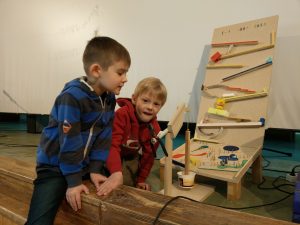
Implementation of the chain experiment in kindergarten
We recommend that children not younger than five years of age participate in the Chain Experiment. At this age, motor skills, perception and intellectual abilities are developed so that it is easier for them to participate in tasks than for younger children.
First of all, we introduce the children to the Chain Experiment. We are most successful if we show them physical phenomena by playing with gadgets that we use in everyday life and that children know. This will make it easier for them to remember the cause-and-effect relationship, and it will be easier for the children to cooperate later when we make the chain. The chain connection can be shown in different ways. For example, we can play over and over by asking a question. When the first child answers a question, touch communicates to the next child to answer. Playing dominoes is also extremely effective. Children place dominoes at a short distance from each other in different directions. Domino experiments are accompanied by a mentor's explanation (which must be understood by the child) describing physical phenomena. Over time, children also acquire other manual skills, such as hammering nails, driving screws, and using various tools.
It is recommended to conduct the Chain Experiment with a group of up to 10 children, they all actively participate, present their ideas and way of thinking. Ideally, the workshops should be attended by 3-4 adults (1 mentor per 3 children) who will advise children and indicate solutions when children encounter an obstacle in the process of implementing an idea or task. Smaller groups of children within one workshop should be composed in such a way that children in the group can exchange - according to their interests and in friendly relations. A possible exchange in the group can be made by a kindergarten teacher who knows the children. Experience shows that children should change activities every 20 minutes to stay focused and interested. The place of the Chain Experiment classes should include several different points of work and the individual phases of the work must be interwoven with fun.
It is important that we stimulate the child's curiosity and the willingness to discover, therefore we plan and implement the action in accordance with the children's suggestions (the mentor encourages critical thinking).
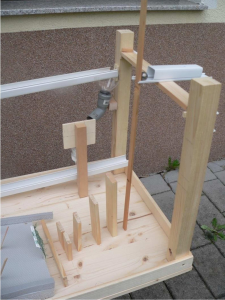
The materials from which the individual elements are made should be simple and inexpensive. It is desirable to use safe and hygienic waste from households, shops, crafts as much as possible. These can be cardboard boxes of disposable handkerchiefs, cardboard rolls of kitchen paper, plastic yoghurt cups, wooden waste, etc. We make sure that the elements that make up the device are strong enough for multiple use, easy to repair or replace, but above all, interesting enough and not too difficult to build, so that we can build them together with children.
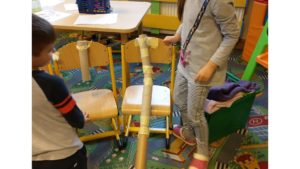
After we have finished building the chain, we remember to celebrate. We organize special shows during which we present the constructed chain, and we invite other children, parents, grandparents and educators to the event.
Usually, those who do not participate in the Chain Experiment workshop are very impressed with the chain and want to build their own.
NB The Chain Experiment is carried out with a group of pre-school children, but it can be carried out with equal success in various age groups.
Please check the Pilgrims f2f courses at Pilgrims website.
Please check the Pilgrims online courses at Pilgrims website.
Bilingual Education and Mathematics in Early Years and Inclusion
Athena Dermentzi, GreecePicture Books About Emotions in Kindergarten Language Classrooms
Agnieszka Dzieciol-Pedich, PolandChain Experiment in Pre-school
Dorota Kaniak-Szymkiewicz, PolandInterviewing Edoardo on LGBTQ Themes in Schools
conducted by Giovanni Licata, ItalyVolunteering with Ukrainian Refugees
Sinem Daridere, TurkiyeStories from the Hands Up Project
Jamie Keddie, SpainTowards Inclusive Learning Environments in Higher Education: A Glance into Perspectives from Education and Language Studies
Yasemin Yelbay Yilmaz, Turkiye‘Savouring’ Learning at Later Ages
Aysen Cem-Deger, TurkiyeTeaching Languages to Students with Specific Learning Differences 2nd edition by Judit Kormos and Anne Margaret Smith
reviewed by Rachael Harris, UK/FranceIntroducing Inclusive Practices and Special Educational Needs to Pre-service Teachers
Hanna Kryszewska, Poland